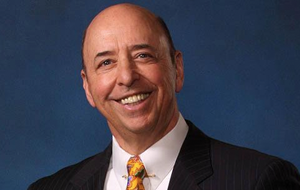(This interview is part of a series highlighting the winners of the Georgia CIO Leadership Association CIO of the Year Awards. Read the intro to this series here.)
 Fran Dramis, former BellSouth CIO who recently took home the lifetime achievement award from the Georgia CIO Leadership Association’s CIO of the Year awards, is a mentor at heart. Throughout his career, he was passionate about helping his employees achieve their career goals, and as a result, many of his former team members are now CIOs themselves.
Fran Dramis, former BellSouth CIO who recently took home the lifetime achievement award from the Georgia CIO Leadership Association’s CIO of the Year awards, is a mentor at heart. Throughout his career, he was passionate about helping his employees achieve their career goals, and as a result, many of his former team members are now CIOs themselves.
We asked Dramis to share some of his best advice and lessons learned for CIOs today. Read on for his take on talent retention, essential skills for CIOs, and how to stay ahead of innovation in IT.

The Enterprisers Project (TEP): You’ve said that you have a passion for IT talent retention – what are some critical steps CIOs should be taking to make sure they train and retain their top talent?
 Dramis: I just completed my third book, called “The Four Secrets of Retention,” and the subtitle is “How to Retain Mind Share in a Very Changing Environment.” In our society now, there is no such thing as job security. And so I believe we, as leaders, have to provide life security to our people. If we can do that, we will retain their mind share for the three to five years that they’re going to spend with us. It’s more attention than retention because they will move on, regardless of what we do, based on societal factors.
Dramis: I just completed my third book, called “The Four Secrets of Retention,” and the subtitle is “How to Retain Mind Share in a Very Changing Environment.” In our society now, there is no such thing as job security. And so I believe we, as leaders, have to provide life security to our people. If we can do that, we will retain their mind share for the three to five years that they’re going to spend with us. It’s more attention than retention because they will move on, regardless of what we do, based on societal factors.
There are a number of ways we can retain mind share. One is creating a set of values that draw people to each other. People want to work where there is a sense of shared values. The second is having them understand that they are strategic to the corporation they’re working in. That’s easy to do if you are working in a technology company, but somewhat harder when you’re in a support role for Coca-Cola or AT&T, for example. But it’s up to us, as senior leaders, to link what they’re doing to the strategy of the company.
The third thing is to actually make them more marketable, which seems counterintuitive. But the fact of the matter is, if a technologist is being trained on and utilizing the newest technologies, that increases their marketability. But it also increases their life security, and therefore they’ll be very loyal and attentive during the time they’re working for you. The fourth way is to offer them the opportunity to learn the skills required to meet their eventual business life goal.
TEP: What skills do you think today's modern CIO needs now versus when you first started in your CIO career?
Dramis: There has been a transition from just educating the people who are working for you toward mentoring them. Mentoring means that you, as a leader, take an active interest in their lives. While they’re passing through your organization, are you doing things that help them, on a step-by-step basis, achieve their end goals? Will they be able to look back at their life with your business and say, “It’s all worthwhile.”
Great CIOs today will find out the elements of what makes it all worthwhile for everyone in their organization. Sometimes it may be income. Sometimes it may be acknowledgment. Sometimes it may be touching people’s lives. Sometimes it may be spiritual. Whatever it is, there’s a path that they are taking through their career. For me, mentoring is not just a feel-good thing. It’s a way of retaining the mind share of people who really understand that you are there to help them in their career.
TEP: Your book, “The CIO Handbook,” contains practical career advice for CIOs. What would you say is the one thing new CIOs can do to ensure a success in their role?
Dramis: I think the thing for all CIOs to understand is that they don’t own the technology; the business owns the technology. It’s our job to instruct and engage the business in the implications of using and continuing to use certain technology. As an example, if I talked to an oil firm and said, “You know about the depreciation of your oil wells, which may be on a 10-year cycle. But do you also know the depreciation of your technology, and that half of your technology is running on devices that our manufacturer discontinued?” Technology is an asset, so learning the language of business and engaging the business in technology issues is the most important thing a CIO can do.
TEP: As CEOs look to their CIOs to find opportunities for revenue generation – what impact do you think that has on the CIO role of today? How should CIOs optimize their teams and their technologies for this new role?
Dramis: CIO is a strategic role. When you’re in a strategy function, your job is to orient the internal organization to its external environment. So CIOs need to understand what’s happening externally in terms of revenue generation – where people are buying, buying power moving directly to consumers, etc. And they need to understand it well enough that they can explain it and put in the necessary underlying technology to enable it to happen. And finally, they need to know the implications of those actions so they can protect the core elements and continuity of the business.
TEP: Where can or should CIOs go to stay current on what's important in the world of IT? Where do you turn?
Dramis: One of the things I wish I would have done more of throughout my career is connect with startup businesses because that’s where innovation is happening. I’ve been working with the CIO of a Fortune 30 company, and my advice to him is to have a venture day: get 10 venture groups to come in and present. The result is you get people thinking about the state of what could be possible, and I think that’s the most effective way of staying on top of things.
TEP: What do you like best about being a part of the Georgia CIO Leadership Association?
Dramis: It’s different for me at this stage of my life and career than it would have been in the middle. Now, I like the ability to have a somewhat captive audience to talk to about things that I’ve learned. Georgia CIO is a conduit for me to continue to touch people’s lives based on the lessons that I’ve learned in my own life as a CIO. If I was just starting my career off, I’d be on the other side of that statement.






